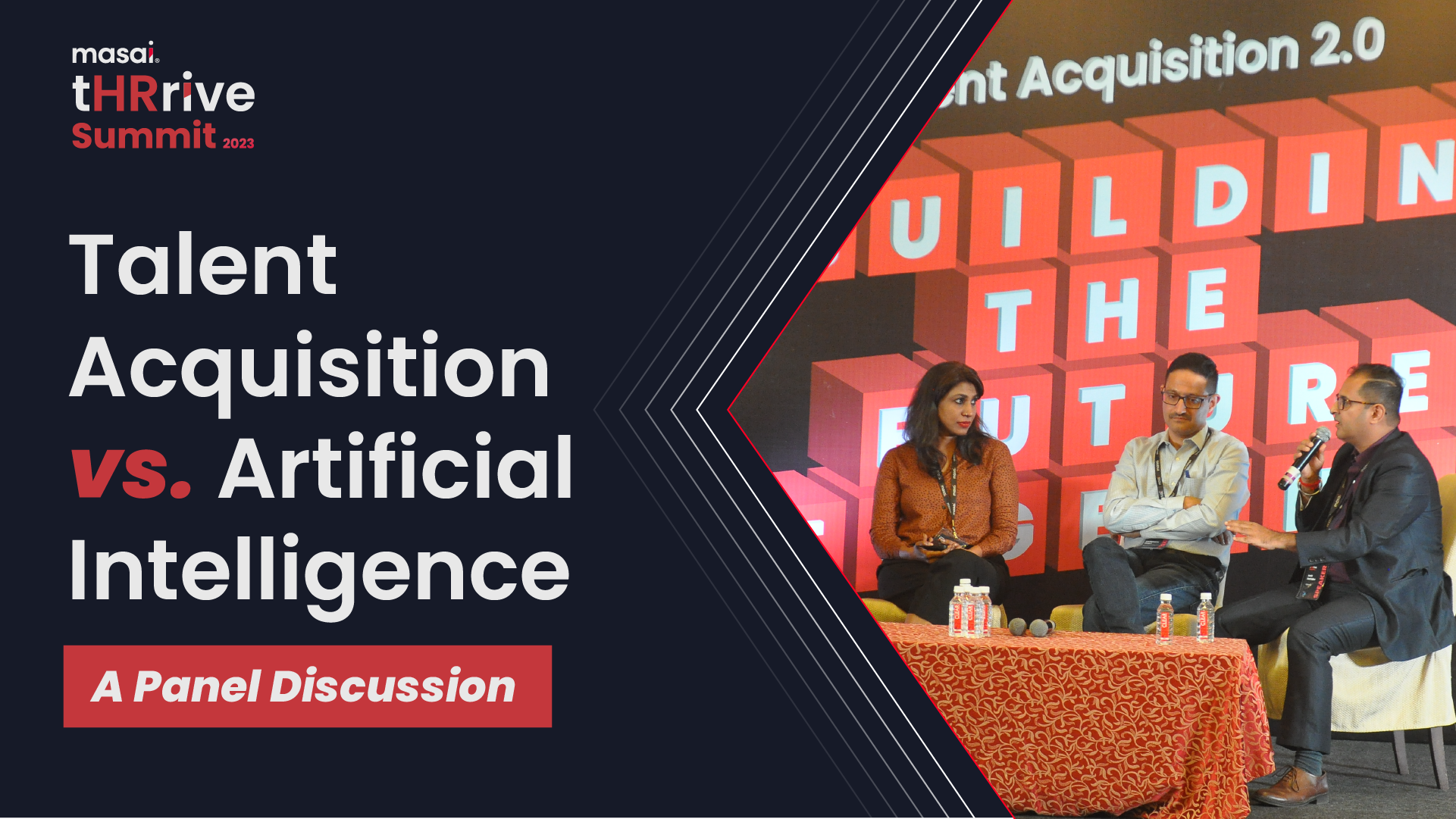The Artificial Intelligence Shift in Talent Acquisition
AI is quickly becoming the go-to technology for recruiters who want to get more done with less. Where scanning through a pile of resumes to sort out probable candidates required days of crude focus and deliberations a few years ago, AI is cutting this process down to minutes if not seconds.

300 million. That is the number of full-time jobs that are going to be partially or fully affected worldwide by the recent Artificial Intelligence wave, according to a new report by Goldman Sachs [1]. All thanks to the emergence of platforms like ChatGPT, Midjourney, Google Bard, DALL-E, and many others.
Welcome to an era that is going to be dictated by AI.
The job market in India has also undergone a drastic transformation in recent years. As the economy gradually grows, companies are expanding and trying to seek the best talent to bolster their success. 2023 is being considered a year of volatility, and talent acquisition strategy is a top priority for most boardroom agendas.
Currently, it would be an understatement to say that there is a lot of chatter around the ChatGPT currently. Its impact is very real with TATs going down in various professions.
But this has brought another facet of recent advancements in generative AI to the fore, raising tough questions in regards to:
- The role of AI in the future workforce
- The application of AI in Talent Acquisition
- The ability of the present and upcoming workforces to adopt AI
It is to answer these questions that we were joined by some brilliant industry leaders who brought together a mindblowing combined experience of 70+ years, for a panel discussion on the topic - Talent Acquisition vs Artificial Intelligence:
- Asha Subramanian - Chief Human Resources Officer, Subex
- Amit Sachdev - Chief People Officer, TATA iQ
- Chitbhanu Nagri - Senior Vice President - People Operations, Razorpay
- Ankur Kayesth - Senior Vice President, Masai (Moderator)
AI in Talent Acquisition
AI is quickly becoming the go-to technology for recruiters who want to get more done with less. Where scanning through a pile of resumes to sort out probable candidates required days of crude focus and deliberations a few years ago, AI is cutting this process down to minutes if not seconds.
Asha Subramanian’s personal experience confirmed the same. She described AI as one of the most beautiful technology inventions.
“In Talent Acquisition, AI is surely helping a lot. The time spent on it has come down to 10% of what we used to spend earlier”
She further delineated another crucial aspect of AI in the context of hiring - the elimination of bias and discrimination. This is indeed a very crucial aspect of talent acquisition that has plagued the system. Numerous studies have shown that the traditional hiring process of recruiters manually reviewing resumés results in a significant unconscious bias against women, minorities, and older workers[2]. AI tools tend to be devoid of such biases and fairer in their assessment focusing more on the factors that really matter such as candidates’ skill sets.
AI has also been of great use in processes following recruitment. It can help create personalised learning models for new candidates solely based on their job role and skill set and by understanding their interests. These models are incredibly valuable for fresh employees as it helps them learn their line of work faster while also ensuring better work productivity. The larger the organisation, the more sense it makes to integrate AI into talent acquisition. AI-powered tools have empowered many applicants to realise their own potential alongside building a successful career trajectory.
The Cost Factor
Apart from the time-saving and bias-reducing factors, AI has a cost-saving attribute to it as well with the cost per hire dropping by as much as 30%[3]. This can allow for more resources to be used in other areas that benefit the organisation, its employees or candidates.
The efficiency and unmatched pace of AI-powered talent acquisition have positively impacted several companies, and the fact that an AI engine doesn’t ever have to take a day has proven to be a game-changer. With the advent of improved chatbots capable of problem-solving and task escalation, recruiters are empowered to focus their energies at the bottom of the job application funnel.
The overall decision-making skill at companies is also expected to increase through each level of the company hierarchy. With AI, job vacancies can be closed faster, saving precious time and space.
Chitbhanu Nagri however was of the opinion that the decision to adopt AI shouldn’t be solely based on the cost-saving aspect of it.
“Technologies are democratising the environment. They are helping us think better, and make better decisions. And I think that’s what these decisions should take into consideration.”
He emphasised looking at how processes would thrive with these technologies and cater to enhancing the hiring experiences by engaging the candidate better while also helping the hiring managers make more informed decisions. This would further enhance the quality of the desired outcomes.
Amit Sachdeva, bringing in the perspective of a TATA group company, used the metaphor of mobile phones. He asked the audience in attendance to raise their hands if they would buy the latest edition of a mobile phone as opposed to purchasing its previous edition. With hardly anyone raising their hands, Amit explained the reason.
“Very few will buy the latest edition to start with because we know that the outgoing model will be cost-effective.”
He explained that similarly, at TATA iQ they don’t base their decision of adopting a technology purely on the basis of cost. They also evaluate its value and longevity.
Does AI Threaten Jobs?
While the value and longevity of AI continue to be assessed, one aspect that has worried most working professionals and job seekers is that it may replace them completely, completing their work faster and more efficiently. The panel members dwelled on this “AI-elephant” in the room at length.
According to the World Economic Forum, by 2025, automation and a new division of labour between humans and machines will disrupt 85 million jobs globally. There is plenty to feel hopeful about for those fearing the onset of a technological change and its impact on human lives.
Yes, artificial intelligence might replace automation within sectors, and yes, it might even enter the creative and entertainment sectors with the ability to write scripts and lyrics and generate visual and audio content, but all’s not lost. The same report also suggests that the robot revolution will create 97 million new jobs.
Amit reasoned that the answer depends on the advancements in the available technology and the way people leverage it. To remain relevant, people must learn to utilise AI technology to become better and more productive at what they do, just exactly as people had to do during the industrial revolution or the more recent technological revolution.
Chitbhanu concurred and added that AI is neither the first technological revolution that humanity has experienced nor is it the last.
“1964 is when for the first time somebody spoke about the concept of a handheld mobile device. 1986 is when the first prototype of a mobile phone was shown, and the 2000s is when the mobile telecom revolution actually came to the fore”
He also gave the example of the automation of banks wherein core banking solutions replaced manual transactional banking. He noted that while these revolutions may have rendered some jobs obsolete, new opportunities also emerged.
Similarly with AI too, there will be a cycle of innovation and adaptation in the business world.
However, while working with AI seems to be the future, a critical question that still looms is what if AI eventually surpasses human capabilities?
Chitbhanu agreed that it is conceptually possible and is the aspect of AI that gets everybody excited the most. However, he expressed his inability to predict how deep and fast this penetration will actually be in the future.
Asha added to the conversation by addressing an aspect of AI that seems to be overlooked - that its efficacy depends entirely on the data fed to it.
Noting that the impact of AI ultimately would depend on how much information is fed into the system, she expressed her belief that mundane or repetitive jobs may be taken over by AI, but in the process, there will also be an addition of millions of millions of jobs.
Interestingly, this is exactly what a report by the World Economic Forum stated AI will indeed displace 85 million jobs by 2025, but will also create 97 million new jobs worldwide.[4]
Building on this, Amit Sachdev too chipped in stating that it is jobs that can be easily automated that will become redundant and here AI will provide cost-effective advantages. But he also inserted an interesting caveat to this discussion when he noted that automation doesn't necessarily mean the end of human jobs. Rather, it simply means that the nature of certain jobs will change.
On the other hand, jobs that require constant upskilling are also the ones that involve skills that cannot be easily automated. This includes but isn’t limited to jobs that require creativity, critical thinking, and emotional intelligence. These jobs will require individuals to develop new skills and adapt to new technologies to remain relevant in the workforce.
Closing Remarks
To round off the discussion, the panel emphasised the importance of integrating technology with a human touch in the field of Human Resources.
The panelists agreed that technology is an enabler that can save time, increase accuracy and provide valuable insights, but it should not replace the fundamental principles of caring for people, advocating for them, and nurturing their growth. They stressed the importance of trust in the HR fraternity, which technology can replicate if used in the right way. The discussion also highlighted the need to constantly upgrade oneself and relearn new skills to stay relevant in the face of technological advancements.
Overall, the panelists agreed that the future of HR is not about choosing between humans or machines, but rather about leveraging technology to augment human capabilities and make better decisions. It is through collaboration and a holistic approach that we can create a better workplace and ultimately drive business outcomes.
FAQs
How AI is changing talent acquisition?
AI has radically impacted the process of hiring new candidates. It can scan through the portfolios, resumes and CVs of thousands of candidates while also ranking them based on their job descriptions.
What is the future of AI in talent acquisition?
AI has empowered recruiters to focus more on understanding the human beneath the job role by forging relationships, fostering individual talent, and making strategic decisions.
Sources:
[2] - https://hbr.org/2019/10/using-ai-to-eliminate-bias-from-hiring
More articles from the tHRive Summit 2023:


